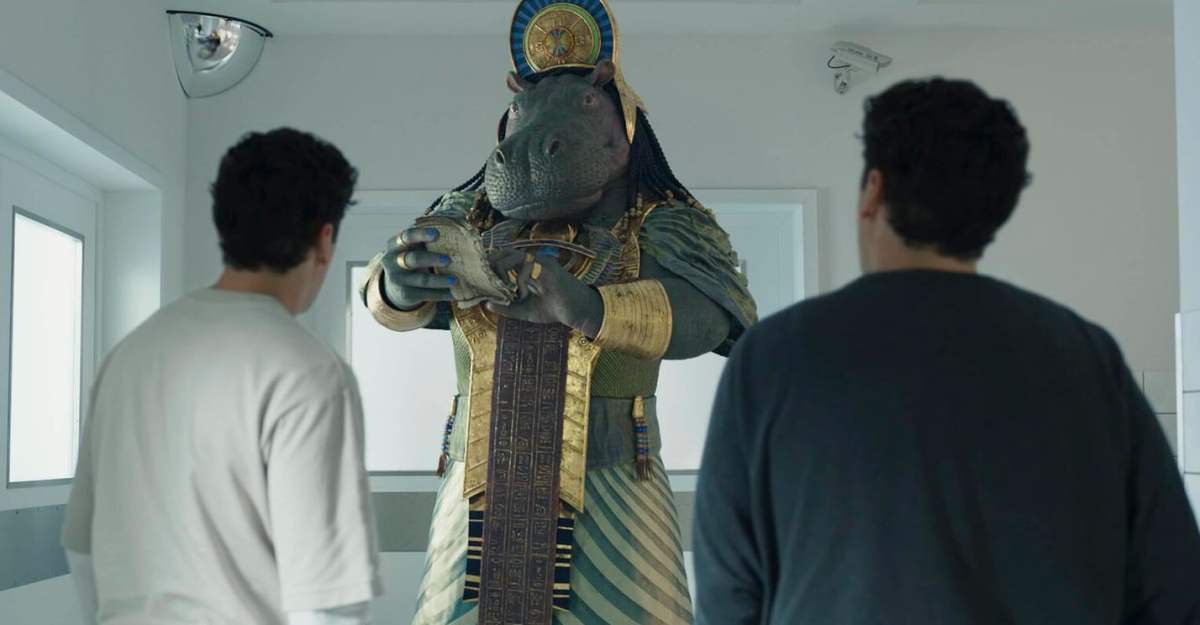This discussion and review contains some spoilers for Moon Knight episode 5, “Asylum,” on Disney+.
It feels somewhat appropriate that one of the most obtuse and abstract episodes of Moon Knight should be followed by one of the most generic and straightforward.
Like its protagonist, Moon Knight has found itself caught between two extremes. On the one hand, it is a show that clearly wants to try new things within the framework of the Marvel Cinematic Universe. After all, five episodes into a six-episode season, it remains largely disconnected from the larger shared universe. It has been perhaps the most experimental of these streaming series in terms of its storytelling since WandaVision, and it is built very much around the interiority of its lead.
On the other hand, Moon Knight is always conscious of the possibility that it might alienate its audience if it allows itself to lean too far into experimentation. Harrow (Ethan Hawke) uses the metaphor of “a pendulum” to describe Marc and Steven’s (Oscar Isaac) fluctuating grasp on reality, and that image applies just as readily to the show itself. Whenever Moon Knight seems like it might commit to its bolder and more interesting idea, it pulls right back to something more comfortable.
“The Tomb” was an intriguing episode because it leaned heavily into the existential nightmare of a concept like Moon Knight. It was an episode built around the idea that human beings are fundamentally alien to one another and that the process of getting to know and understand another person — or even one’s own self — was essentially an excavation. It was about piecing together clues, understanding context, looking for impressions in the sand.

“The Tomb” ended with a sharp jolt, as Marc and Steven found themselves imagining life inside a psychiatric institution as they questioned the nature of their reality. It was a compelling hook for the show, although it felt somewhat frustrating that Moon Knight could only really play with that sort of ambiguity two-thirds of the way through the season. The twist should have been disorienting and jarring to the audience, but instead it seemed like just another way to extend the plot.
Had Moon Knight opened with Marc and Steven in that psychiatric institution, as Legion opened with David Haller (Dan Stevens) committed, there might have been some tension about what was reality and what was fantasy. However, four episodes into the season, the audience already has a firm grasp on the rules of Moon Knight. The psychiatric ward is not so much a mind-screw as just another new aesthetic layered on top of a familiar story.
It feels like little more than a continuity in-joke. Jeff Lemire and Greg Smallwood’s Moon Knight run opened with the hero in such a place, and the show seems to be riffing on that imagery rather than using it to any purpose. It is similar to the decision to dress Steven in the character’s “Mr. Knight” persona, created by Warren Ellis and Declan Shalvey, with Shalvey receiving no compensation for its use. The choice doesn’t say anything about Steven as a character, but it is a cool visual.
This is typical of how Marvel Studios tells these stories, particularly in the streaming format. When the company launched WandaVision on Disney+, it arranged a multi-episode premiere. It is the only time that Marvel has taken such an approach, and it seems likely that it was a calculated choice to ensure that the fans weren’t too alienated by the more surreal elements of the first episode, with the premiere ending on the transition to color from black and white.

So, following “The Tomb,” “Asylum” is a frustratingly generic and paint-by-numbers episode of television that makes an effort to fill all of the narrative lacunas suggested by earlier episodes in the most pedestrian manner possible. There are interesting parallels to “Monsters,” a recent episode of Star Trek: Picard, which falls back on similar narrative devices and clichés, seeking to pathologize its lead character by adding a mentally ill mother and heavily implying child abuse.
As with “Monsters,” the revelations about Marc and Steven’s relationship to their mother (Fernanda Andrade) in “Asylum” would be more compelling had Moon Knight done the groundwork of properly foreshadowing that history of trauma and violence. In a better version of Moon Knight, this late-season story beat would feel like a satisfying payoff to an idea seeded and built through the earlier episodes. After all, troubled relationships between parents and children make for compelling drama.
Instead, it feels like a strangely cynical choice in the season’s penultimate episode, an attempt to create a tragic backstory that neatly explains and rationalizes a complex and contradictory character through a convenient chain of cause and effect. The horrors that Marc and Steven experienced at home seem intended to allow the audience to excuse Marc’s violence and brutality, rather than interrogate it. Marc is a victim, so his own actions aren’t his fault.
Again, there is a sense of Moon Knight wanting to grapple with big and thorny ideas but is unwilling to commit. It is similar to the ending of WandaVision, where Wanda’s (Elizabeth Olsen) violation of an entire town is casually excused with a trite, “They’ll never know what you sacrificed for them.” Early in the episode, Steven is horrified when confronted by a room full of people that Marc killed. There is a sense that Steven is not reassured by Marc’s claims that these were bad people.

However, after the revelations, those same victims return as zombies to claim Marc. Steven shows no such hesitation or introspection. Marc’s trauma serves largely to absolve him of any guilt or moral ambiguity that comes from transforming himself into a vigilante killing machine. It is all frustratingly neat, avoiding any of the lingering or uncomfortable questions suggested in the earlier episodes of the season. As such, Marc and Steven’s childhood trauma feels like a calculated gamble.
There are interesting ideas here. Most obviously, “Asylum” draws a clear connection between the pair’s abusive mother and the vengeful deity Khonshu (F. Murray Abraham), with Steven explicitly describing him as a “sneaky old vulture” and recognizing that he is preying on Marc’s vulnerability and fractured psyche for his own ends. It’s a beat that fits with Khonshu’s characterization to this point, but it might work better if the show hadn’t also cast Khonshu as comic relief.
Similarly, the revelation that Steven is the alternate personality and Marc was the original personality is a solid narrative development at this point in the story, and it’s nice that Moon Knight doesn’t treat it as a penultimate episode cliffhanger. “You made me up?” Steven asks, understanding that he was the alternate personality that Marc created to cope with the abuse that he received at the hands of his mother — to serve as Marc’s “stress ball.”

Again, there is a sense that Moon Knight is wary of making the dynamic too thorny or uncomfortable. Notably, Marc didn’t create Steven to take the abuse for him. Instead, Marc created Steven as an isolated and idealized part of himself, one removed from the trauma to the point that he could retain a healthy relationship with their mother. There’s a sense that, had Marc created Steven to suffer in his place, even as a child, that might make Marc unsympathetic to the audience.
The reveal that Steven is an alternate personality rather than the original personality is perhaps quite predictable. Given how much of the show has been told from Steven’s point of view, revealing that he “isn’t real” is a solid twist. It might also help explain Oscar Isaac’s cartoon accent. However, there is nothing inherently wrong with that. In many cases, the best plot beats are those that flow naturally from the story being told, and this certainly fits.
This may be the biggest problem with “Asylum.” It’s an episode about a messy and complicated central character that adamantly insists that everything must neatly fit within a predetermined template.






Published: Apr 27, 2022 11:00 am